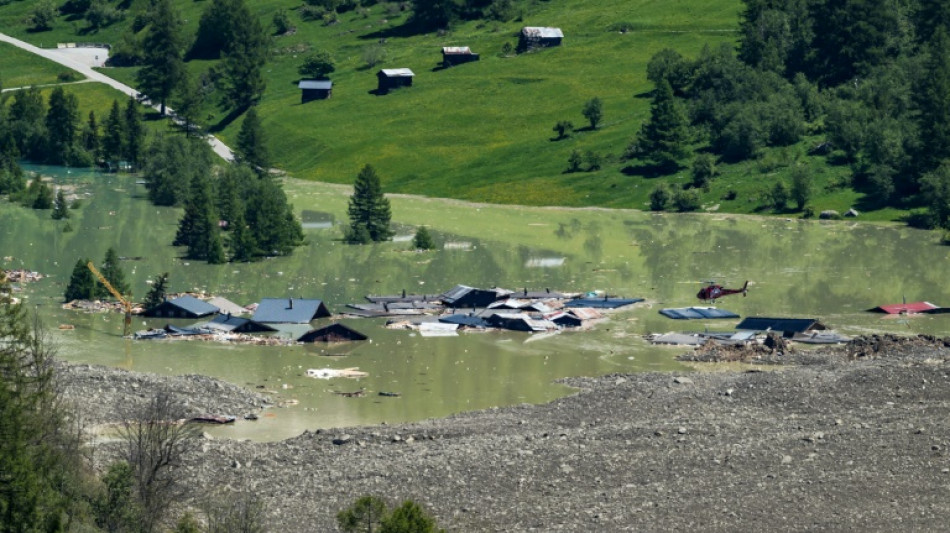
-
 Susan Sarandon to be honoured at Spain's top film awards
Susan Sarandon to be honoured at Spain's top film awards
-
Trump says 'time running out' as Iran rejects talks amid 'threats'

-
 Spain eyes full service on train tragedy line in 10 days
Spain eyes full service on train tragedy line in 10 days
-
Greenland dispute 'strategic wake-up call for all of Europe,' says Macron

-
 'Intimidation and coercion': Iran pressuring families of killed protesters
'Intimidation and coercion': Iran pressuring families of killed protesters
-
Europe urged to 'step up' on defence as Trump upends ties

-
 Sinner hails 'inspiration' Djokovic ahead of Australian Open blockbuster
Sinner hails 'inspiration' Djokovic ahead of Australian Open blockbuster
-
Dollar rebounds while gold climbs again before Fed update

-
 Aki a doubt for Ireland's Six Nations opener over disciplinary issue
Aki a doubt for Ireland's Six Nations opener over disciplinary issue
-
West Ham sign Fulham winger Traore

-
 Relentless Sinner sets up Australian Open blockbuster with Djokovic
Relentless Sinner sets up Australian Open blockbuster with Djokovic
-
Israel prepares to bury last Gaza hostage

-
 Iran rejects talks with US amid military 'threats'
Iran rejects talks with US amid military 'threats'
-
Heart attack ends iconic French prop Atonio's career

-
 SKorean chip giant SK hynix posts record operating profit for 2025
SKorean chip giant SK hynix posts record operating profit for 2025
-
Greenland's elite dogsled unit patrols desolate, icy Arctic

-
 Dutch tech giant ASML posts bumper profits, cuts jobs
Dutch tech giant ASML posts bumper profits, cuts jobs
-
Musetti rues 'really painful' retirement after schooling Djokovic

-
 Russian volcano puts on display in latest eruption
Russian volcano puts on display in latest eruption
-
Thailand uses contraceptive vaccine to limit wild elephant births

-
 Djokovic gets lucky to join Pegula, Rybakina in Melbourne semi-finals
Djokovic gets lucky to join Pegula, Rybakina in Melbourne semi-finals
-
Trump says to 'de-escalate' Minneapolis, as aide questions agents' 'protocol'

-
 'Extremely lucky' Djokovic into Melbourne semi-finals as Musetti retires
'Extremely lucky' Djokovic into Melbourne semi-finals as Musetti retires
-
'Animals in a zoo': Players back Gauff call for more privacy

-
 Starmer heads to China to defend 'pragmatic' partnership
Starmer heads to China to defend 'pragmatic' partnership
-
Uganda's Quidditch players with global dreams

-
 'Hard to survive': Kyiv's elderly shiver after Russian attacks on power and heat
'Hard to survive': Kyiv's elderly shiver after Russian attacks on power and heat
-
South Korea's ex-first lady jailed for 20 months for taking bribes

-
 Polish migrants return home to a changed country
Polish migrants return home to a changed country
-
Dutch tech giant ASML posts bumper profits, eyes bright AI future

-
 South Korea's ex-first lady jailed for 20 months for corruption
South Korea's ex-first lady jailed for 20 months for corruption
-
Minnesota congresswoman unbowed after attacked with liquid

-
 Backlash as Australia kills dingoes after backpacker death
Backlash as Australia kills dingoes after backpacker death
-
Brazil declares acai a national fruit to ward off 'biopiracy'

-
 Anisimova 'loses her mind' after Melbourne quarter-final exit
Anisimova 'loses her mind' after Melbourne quarter-final exit
-
Home hope Goggia on medal mission at Milan-Cortina Winter Olympics

-
 Omar attacked in Minneapolis after Trump vows to 'de-escalate'
Omar attacked in Minneapolis after Trump vows to 'de-escalate'
-
Pistons escape Nuggets rally, Thunder roll Pelicans

-
 Dominant Pegula sets up Australian Open semi-final against Rybakina
Dominant Pegula sets up Australian Open semi-final against Rybakina
-
'Animals in a zoo': Swiatek backs Gauff call for more privacy

-
 Japan PM's tax giveaway roils markets and worries voters
Japan PM's tax giveaway roils markets and worries voters
-
Amid Ukraine war fallout, fearful Chechen women seek escape route

-
 Rybakina surges into Melbourne semis as Djokovic takes centre stage
Rybakina surges into Melbourne semis as Djokovic takes centre stage
-
Dollar struggles to recover from losses after Trump comments

-
 Greenland blues to Delhi red carpet: EU finds solace in India
Greenland blues to Delhi red carpet: EU finds solace in India
-
Will the EU ban social media for children in 2026?

-
 Netherlands faces 'test case' climate verdict over Caribbean island
Netherlands faces 'test case' climate verdict over Caribbean island
-
Rybakina stuns Swiatek to reach Australian Open semi-finals

-
 US ouster of Maduro nightmare scenario for Kim: N. Korean ex-diplomat
US ouster of Maduro nightmare scenario for Kim: N. Korean ex-diplomat
-
Svitolina credits mental health break for reaching Melbourne semis


Swiss glacier collapse offers global warning of wider impact
The collapse of the Swiss Birch glacier serves as a chilling warning of the escalating dangers faced by communities worldwide living under the shadow of fragile ice, particularly in Asia, experts say.
Footage of the May 28 collapse showed a huge cloud of ice and rubble hurtling down the mountainside, into the hamlet of Blatten.
Ali Neumann, disaster risk reduction advisor to the Swiss Development Cooperation, noted that while the role of climate change in the specific case of Blatten "still needs to be investigated", the wider impacts were clear on the cryosphere -- the part of the world covered by frozen water.
"Climate change and its impact on the cryosphere will have growing repercussions on human societies that live near glaciers, near the cryosphere, and depend on glaciers somehow and live with them," he said.
The barrage largely destroyed Blatten, but the evacuation of its 300 residents last week averted mass casualties, although one person remains missing.
"It also showed that with the right skills and observation and management of an emergency, you can significantly reduce the magnitude of this type of disaster," Neumann said at an international UN-backed glacier conference in Tajikistan.
Stefan Uhlenbrook, Director for Hydrology, Water and Cryosphere at the World Meteorological Organisation (WMO), said it showed the need for vulnerable regions like the Himalayas and other parts of Asia to prepare.
"From monitoring, to data sharing, to numerical simulation models, to hazard assessment and to communicating that, the whole chain needs to be strengthened," Uhlenbrook said.
"But in many Asian countries, this is weak, the data is not sufficiently connected."
- 'Not enough' -
Swiss geologists use various methods, including sensors and satellite images, to monitor their glaciers.
Asia was the world's most disaster-hit region from climate and weather hazards in 2023, the United Nations said last year, with floods and storms the chief cause of casualties and economic losses.
But many Asian nations, particularly in the Himalayas, lack the resources to monitor their vast glaciers to the same degree as the Swiss.
According to a 2024 UN Office for Disaster Risk Reduction report, two-thirds of countries in the Asia and Pacific region have early warning systems.
But the least developed countries, many of whom are in the frontlines of climate change, have the worst coverage.
"Monitoring is not absent, but it is not enough," said geologist Sudan Bikash Maharjan of the Nepal-based International Centre for Integrated Mountain Development (ICIMOD).
"Our terrains and climatic conditions are challenging, but also we lack that level of resources for intensive data generation."
That gap is reflected in the number of disaster-related fatalities for each event.
While the average number of fatalities per disaster was 189 globally, in Asia and the Pacific it was much higher at 338, according to the Belgium-based Centre for Research on the Epidemiology of Disasters’ Emergency Events Database.
Geoscientist Jakob Steiner, who works in climate adaptation in Nepal and Bhutan, said it is not as simple as just exporting the Swiss technological solutions.
"These are complex disasters, working together with the communities is actually just as, if not much more, important," he said.
- 'Sad disparity' -
Himalayan glaciers, providing critical water to nearly two billion people, are melting faster than ever before due to climate change, exposing communities to unpredictable and costly disasters, scientists warn.
Hundreds of lakes formed from glacial meltwater have appeared in recent decades. They can be deadly when they burst and rush down the valley.
The softening of permafrost increases the chances of landslides.
Declan Magee, from the Asian Development Bank's Climate Change and Sustainable Development Department, said that monitoring and early warnings alone are not enough.
"We have to think... about where we build, where people build infrastructure and homes, and how we can decrease their vulnerability if it is exposed", he said.
Nepali climate activist and filmmaker Tashi Lhazom described how the village of Til, near to her home, was devastated by a landslide earlier in May.
The 21 families escaped -- but only just.
"In Switzerland they were evacuated days before, here we did not even get seconds," said Lhazom.
"The disparity makes me sad but also angry. This has to change."
G.Schmid--VB



